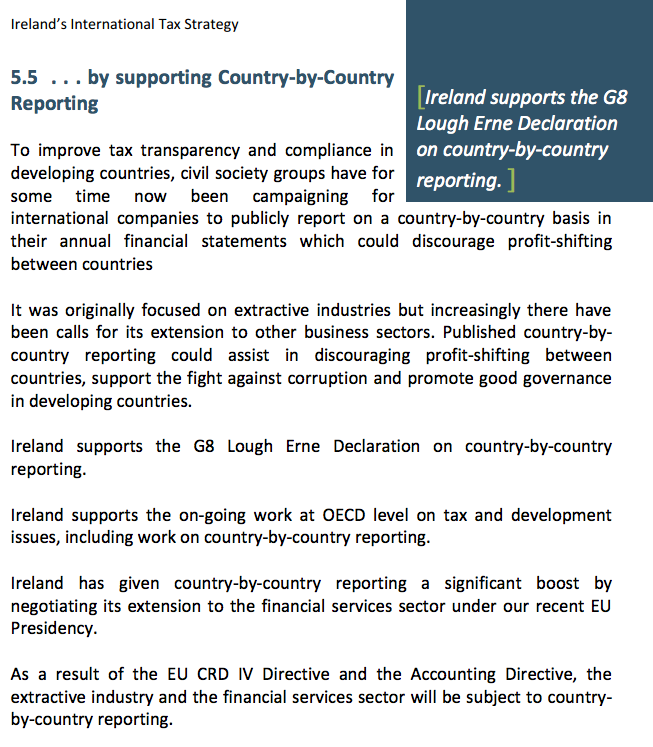Ireland has issued a statement on its international tax strategy.
It has to be said much of this is PR and an implausible defence of the unsustainable 12.5% corporation tax policy that has done so much harm to the country and to its international standing. The word Google also seems to avoid a mention.
However, there is one issue on which the statement is clear:
That's still not getting the whole story of country-by-country reporting or what it can deliver. But I take a little pleasure from it.
Thanks for reading this post.
You can share this post on social media of your choice by clicking these icons:
You can subscribe to this blog's daily email here.
And if you would like to support this blog you can, here:




So Ireland wants to encourage trade and therefore has a 12.5% tax rate on active income. Passive income is taxed at 25%.
Why exactly do you think that this is unsustainable?
Maybe you have not noticed what happened to its economy
Are you an evidence free dogma zone?
I thought the issue is one of tax base not tax rate – other countries also have low rates of tax and their economy has done rather week – Hong Kong and Singapore for example
You think Singapore – a deeply socialist state in practice but not doctrine – and Hong Kong – part of China- are typical economies for comparison purposes?
Speaking of evidence, where is the evidence to support your suggestion that a low CT rate is what caused Ireland’s banking crisis?
Square pegs in round holes.
If you are saying evidence in the sense that A leads to B leads to C then there is, of course, none at all
If instead you apply the approach that is required – that the creation of an environment induced by low tax of hot money using Ireland with little real commitment as much of it was merely exploiting the place as a conduit that then lead to an unstable speculative market in property as rent was extracted from that migrant cash that needed a location for so called ‘investment’ in the domestic market that was unable to absorb it in any useful way – then the evidence is utterly compelling
I know nothing of Justin Pearce but do you and he have history? Abuse of your correspondents is neither a good way to encourage debate nor the hallmark of a serious professional.
Mr Pearce made a perfectly reasonable point. Ireland’s recent history is well documented, as are the resulting Court cases. Basically, politicians creating an unsustainable boom, bankers lending irresponsibly and property developers borrowing irresponsibly, with some criminality from all three parties. There are good reasons to dislike Ireland’s low CT rate but I do not see how it relates to the financial crisis.
An economy built on unstable hot funds,n encouraged by tax abuse reflecting a culture of greed and financial excess was unrelated to Ireland’ failure?
If you cannot see the link that is choice on your part and I cannot argue with the wilfully blind
From Wikipedia:
“The Irish economy expanded rapidly during the Celtic Tiger years (1994—2007) due to a low corporate tax rate, low ECB interest rates, and other systemic factors (such as soft surveillance of banking supervision including against observance of Basel Core Principles, underdeveloped public financial management and anti-corruption systems and adoption of poor policies including a corporate tax system that fostered non-tradable goods and services through the construction industry). This led to an expansion of credit and a property bubble which petered out in 2007. Irish banks, already over-exposed to the Irish property market, came under severe pressure in September 2008 due to the global financial crisis of 2007—2010.
Irish banks’ foreign borrowings rose from €15bn to €110bn in 2004-08.[11] Much of this was borrowed on a three-month rollover basis to fund building projects that would not be sold for several years. When the properties could not be sold due to oversupply, the result was a classic asset—liability mismatch. At the time of the 2008 government bank guarantee the banks were said to be illiquid (but not insolvent) by €4bn, which turned out to be a huge underestimate.”
And I cannot argue with someone who ignores my question and then deliberately misses the point! Your first sentence is totally in agreement with what I said. There is however no link to the low CT rate, which many, including me, dislike but which is part of the law set by a democratically elected Government and therefore cannot be sensibly described as abuse.
Your suggestion is that all international tax abuse by any elected government is by definition acceptable
I think you’ll find a great many people who will disagree with you including the G8 and G20